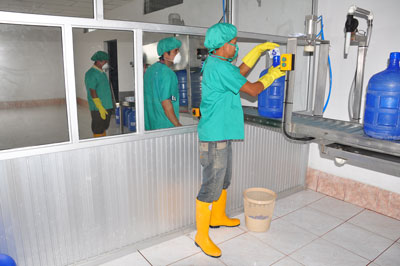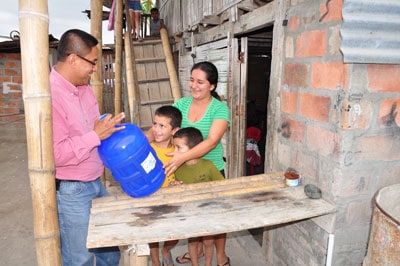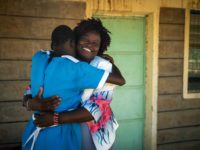For decades, Manabí Province in Ecuador has endured destructive weather extremes. It has suffered the strong impact of the “El Niño” phenomenon that floods huge areas and destroys crops and properties, and kills animals and sometimes even people. It has also endured droughts with similar disastrous consequences.
Of course, both extremes cause other serious problems like food scarcity, water pollution and health epidemics. It is easy to understand why the inhabitants of this province live in severely unsanitary conditions and why their quality of life is so poor.
Where Does Their Water Come From?
“The water we consume comes from different sources,” says Anet Delgado, Director of Estrella de Jacob Student Center in Manabí. “About 20 to 25 percent of the population consumes potable water – that only comes every other day. The rest of the people, who generally live in higher zones, don’t have pipes and consume water from tank trucks. Others take it out of wells.”
Other families fill containers with water from the river and use animals to transport it.
All the various origins of the vital liquid have one thing in common: None provide the people with safe water, and the province’s health statistics confirm this.
Eddy Delgado, administrator of the new water purifying plant, reports, “One of the most serious problems of the families in Manabí is parasites. That’s what we see all the time at public health centers. Another problem is the constant presence of skin allergies and infections caused by a kind of water that is not even good for taking a shower. How can it be good for human consumption?”
The high incidence of parasite-related diseases, gastrointestinal problems, skin allergies and infections, and cavities in children is the consequence of poor water quality. And this was the definitive reason that motivated Compassion, along with Camino de Santidad (Righteousness’ Path) Mission, one of the organization’s church partners, to do something about it.

Why Don’t We Build a Water Purifying Plant?
Pedro del Hierro, pastor of Camino de Santidad Church, has gained a significant amount of experience in his 22 years of ministry in Manabí. Such experience guaranteed the successful construction and operation of a water purifying plant in Montecristi Township.
“Some time ago we opened a little plant at El Florón. It was donated by people from the United States,” Pastor del Hierro recalls. “But its supply was just enough for El Florón community. Brother César Parra (Program Implementation Manager of Compassion – Ecuador) visited that little plant and suggested the idea of finding a donor to finance a new purifying plant here in Montecristi.”
Making this venture come true has benefited thousands of children and their families. The cost was more than U.S.$55,000, which was covered by Compassion and a local contribution from Camino de Santidad.
Thanks to the devoted work of Pastor del Hierro, along with groups of interest and influence like the Municipality of Manabí, the Rotary Club of Portoviejo city, and Leopoldo Izquieta Pérez National Institute for Hygiene and Medicine, all obstacles were surpassed in order to obtain high quality unprocessed water at a lower cost, receive all the necessary official permissions, and begin construction and operation of the water purifying plant.
This brand-new plant will supply, among other areas, the 21 Compassion-assisted centers in Manabí Province. These child development centers assist 6,394 boys, girls and adolescents. With the consumption of this water, the number of cases of parasites and cavities among children is expected to drop from 80 percent to 50 percent.
The Water Purifying Plant
The water purification process at this plant is meticulous and meets all quality standards. “This plant can offer excellent quality purified water. We’d like the health authorities to visit this plant just to see their faces of surprise,” says Alcides Castillo, quality control technician at the plant.
The 60,000 liters of safe, purified and fluoridated water the plant can produce will benefit two groups of people at a reasonable price: the 21 centers and, of course, the families of the sponsored children and the churches that these families attend. “Many families don’t have sponsored children but are part of our congregations, so we will help them, too. About 12,000 families attend the churches located all around Manabí Province,” says Eddy Delgado.
The Beneficiaries of this Venture
Eddy believes this venture benefits many people directly and indirectly. “The direct beneficiaries of the water from the purifying plant are the children and their families. From my point of view, the indirect beneficiary is the government because we are helping them to improve the health conditions of this entire community. We are helping to stop a problem that hasn’t been eradicated in Manabí in a very, very long time.”

“There’s no doubt that the plant will promote positive cultural changes because,” according to Ana Vinueza, Director of Antioquia Student Center, “the people are going to learn to consume safe water, to take better care of themselves, and to prevent various diseases.”
This safe water will cost a little bit more than they are used to paying to the tank trucks that provide them with risky potable water. “But no matter the cost, this water will keep these families from lots of illnesses. We have to educate them and make them understand the benefits,” says Pastor del Hierro.
Once the plant begins fully operating, the improvement in children’s health will be quickly noticeable. This can be nothing but a great reason to be thankful to all the people who made this significant improvement in the living conditions of hundreds of families from Manabí province.
“I think that we should congratulate them for their vision first,” says Eddy, “because improving the health of human beings is an excellent way to invest money.”
The changes brought about by the water purifying plant will definitely be positive for Pastor del Hierro. “There’s no doubt about it,” he says, “because we believe it’s more important to prevent now than to heal later.”
Anet Delgado doesn’t forget the sponsors and donors whose financial support made this venture possible. “We’re deeply grateful to them because it was God who put the desire of doing this within their hearts,” she explains, smiling broadly.







7 Comments |Add a comment
Hi, can you tell me more recent news about Manabi? Specifically 15 de Abril area?
I am writing on Nov 13, 2016.
Luz, what kind of information are you hoping to learn?
Thank you for sharing this story! I sponsor children in Ecuador and I think one might be in this area. Could you tell us the numbers of the projects that will be benefitting from this water purification process?
Of course, and thanks for your prayers and support. The numbers and names of the projects are:
Please if you need something else or to suggest How We can improve our outcomes, don´t hesitate to send another message.
Taking things for granted like water is so easy to do. Last night I was holding our 5 month old and told my wife some where out there is a baby like ours going to bed in the freezing cold. I think reaching out to people is what the world needs to get involved in.
This is so exciting. I must say from having lived in Bolivia for a while that clean water can be so HUGE!!! I’m so glad that you did this. Why did you make the cost of the water a little higher than what they are paying right now?
Thanks for your message. I´m “complementary interventions administrator” in Ecuador. The proccess for improving the water has been implemented with the best standars of quality. The water we are providing now is much better than others in the place and is equal than the best companies in Manabi.
I confirm you the cost now is cheaper than other companies that produce water with bad quality. Blessings.